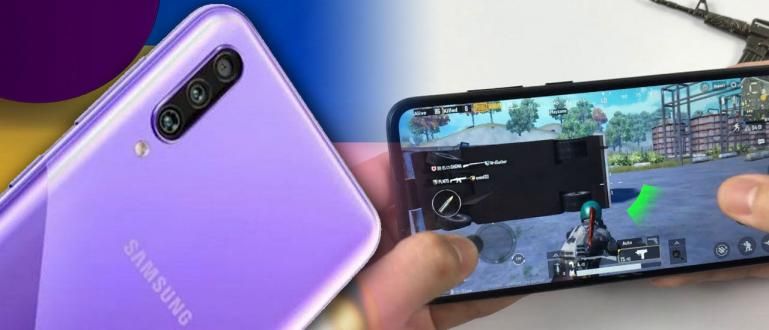Want to know the difference between 32 Bit and 64 bit Android smartphones? Surely you've heard of this, right? Let's see the review!
Basically, the Android smartphone that you usually use consists of various components hardware that work with each other to support the activities of its users. Among these components, several components such as processor, RAM and internal memory play a very important role. When it comes to specifications, users will prioritize these three aspects, especially the processor.
However, some people do not realize that apart from the processor frequency, there are other aspects that can affect the performance of Android smartphones, namely the number of bits owned by the Android smartphone itself, namely 32 bit and 64 bit. Then what's the difference? Read on for this Jaka article, okay!
- This is the difference between 32bit and 64bit Windows that you definitely don't know
- Cool! These are the Death of Star Wars Characters in 8-bit Video
- Cool Android HD Wallpaper Collection with 8-Bit Format
Difference between 32 Bit and 64 Bit Android Smartphone
Well, surely some of you are wondering what is meant by the number of bits on Android smartphones? What's the difference between Android smartphones with 32 bits and 64 bits? Well, if you want to know, take a good look at Jaka's explanation about 32-bit and 64-bit Android smartphones and the differences.
1. A Brief Explanation of Bits on Android Smartphone Processors
Technically, bits are binary digit system with bases 1 and 0 which are used as the smallest unit in storing digital data or information. A bit can only be stored by digital devices, such as Android smartphone processors. The number of bits owned or stored in the processor describes the how big is the capacity owned by registry the processor.

Photo source: Photo: virtantiq.com
What is a registry? Registry is a kind of data storage which is located on the processor of your Android smartphone and is used to store information. So, basically the number of bits on the processor very influential the ability of your Android smartphone to process and store data.
 VIEW ARTICLE
VIEW ARTICLE 2. Differences between 32 Bit and 64 Bit Android Smartphones
- Processor Side
As Jaka explained in the first point, the registry is used by the processor to store data. The more space to store data, then the more data which you can save and getting smoother the data flow is running. That's how the processor registry works on your Android smartphone.

Photo source: Photo: farnet.ir
32 bit Android smartphone processor can store about 4 billion data, while 64 bit Android smartphone processor can store 18 billion billion data. In other words, the 64 bit Android smartphone can save much more data data compared to a 32 bit Android smartphone.
Uh, wait, 18 billion billion? Did you write it wrong? Of course not, because a 64-bit processor has storage capacity very far apart compared to 32-bit processors. Meanwhile, for data processing speed problems, 64-bit Android smartphones can process data faster because they can processing computational value in one go with a lot more compared to 32 bit Android smartphones.

Photo source: Photo: androidguys.com
For example, if your Android smartphone processor will process 256 computational values, using a 32-bit Android smartphone, the processor requires 8 rounds process to complete the computation value of 256. While 64 bit Android smartphone only takes 4 rounds process only.
- RAM and Android Application Side
When discussing the relationship between the 32 bit value and the 64 bit value for RAM on your smartphone, the first answer is a 64 bit Android smartphone can use more RAM compared to 32-bit Android smartphones. When you use Android apps from Play Store as well as Android applications from outside the Play Store, of course these applications will require RAM performance also. Well, this is where the 32-bit and 64-bit values have an effect.

Photo source: Photo: theregister.co.uk
If you have a 32-bit Android smartphone, then the app is can only use as much RAM max 4GB, while for 64 bit Android smartphones can take advantage of Maximum RAM is 8GB. Of course, the more RAM capacity that can be used, the ability of your Android smartphone will also increase. For example, when you are playing an Android game, the RAM capacity will greatly affect the performance of the game.

Photo source: Photo: mobitsilutions.com
Maybe some of you will say that even today's Android smartphone no one has reached 8GB RAM yet? OK, but remember, technology is always evolving and did not rule out the next 5 years this could happen. In fact, we might even be able to add Android RAM easily.
Not only that, what if later the requirements for Android applications on the Play Store and from outside the Play Store? Requires a large amount of RAM? Well, maybe 5-10 years from now. What is certain is that in terms of RAM and overall Android performance, it is undeniable that a 64-bit Android smartphone is much better.
3. How to Find out 32 Bit Or 64 Bit Android Smartphone
After knowing the difference between 32-bit and 64-bit Android smartphones, of course what you need to do next is check whether your Android smartphone is classified as 32-bit or 64-bit. Well, to find out, Jaka has an application that can check whether your smartphone is a 32-bit or 64-bit type. The name of this app is AnTuTu Benchmark.
- First of all, you have to download the application first AnTuTu Benchmark below and directly install on your Android smartphone.

Photo source: Photo: AnTuTu Benchmark
 Apps Productivity AnTuTu DOWNLOAD
Apps Productivity AnTuTu DOWNLOAD After the installation is complete, open the application and to see if your Android smartphone is 32 bit or 64 bit, just navigate to it to the notification section.
In this section, you can view smartphone type information Your Android, does it include 32 bit or 64 bit. Not only that, you can also see the model of the processor embedded in your smartphone and the frequency of your processor.

Photo source: Photo: AnTuTu Benchmark
Well, that's the understanding and difference between 32-bit and 64-bit Android smartphones. Hopefully this information from Jaka is useful! So, which one do you prefer? Please share Your choice in the comments column below.









